Björn af Kleen
Björn af Kleen was selected for the 2024 Shortlist with Four Hundred Boys Came Into Contact With Sweden’s Celebrated Foster Father – Several Tell of Abuse
Björn af Kleen, born in 1980, is a reporter at large at Dagens Nyheter, Sweden’s largest morning newspaper. He’s been a correspondent in Washington DC, worked as an investigative reporter in Stockholm and currently reports from New York City on the American election year of 2024. He has written several non-fiction books about the Swedish elite.
Four Hundred Boys Came Into Contact With Sweden’s Celebrated Foster Father – Several Tell of Abuse
The original publication of the project is embedded below. Underneath, find the full English text.
The fragments of memory are sharp.
“It feels like a big fucking knife stabbing you,” says Morgan Hult.
He is testifying about abuse that happened 40 years ago.
“I have fragments of the abuse in my mind: how you scream and cry and you can’t get away from it.”
In the mid-1980s, Morgan lived for three years at Eolshäll, a home for boys with “social problems” in Hägersten, south of Stockholm.
Göthe Ohlsson, the Storfosterhemspappan [“great foster father”], is famous throughout Sweden for his unfailing ability to tame troubled teenage boys. But several of his foster sons say he abused them at Eolshäll, a three-storey yellow stone house on a headland by Lake Mälaren. The following is what several of the troubled teenagers told DN.
The events are several decades old, but the stories are corroborated by other consistent testimony, court documents and social service records. DN has tracked down the men and interviewed them independently.
Over three decades — according to Göthe Ohlsson’s own account — more than 400 boys came into close contact with him through his foster homes and affiliated youth organisations.
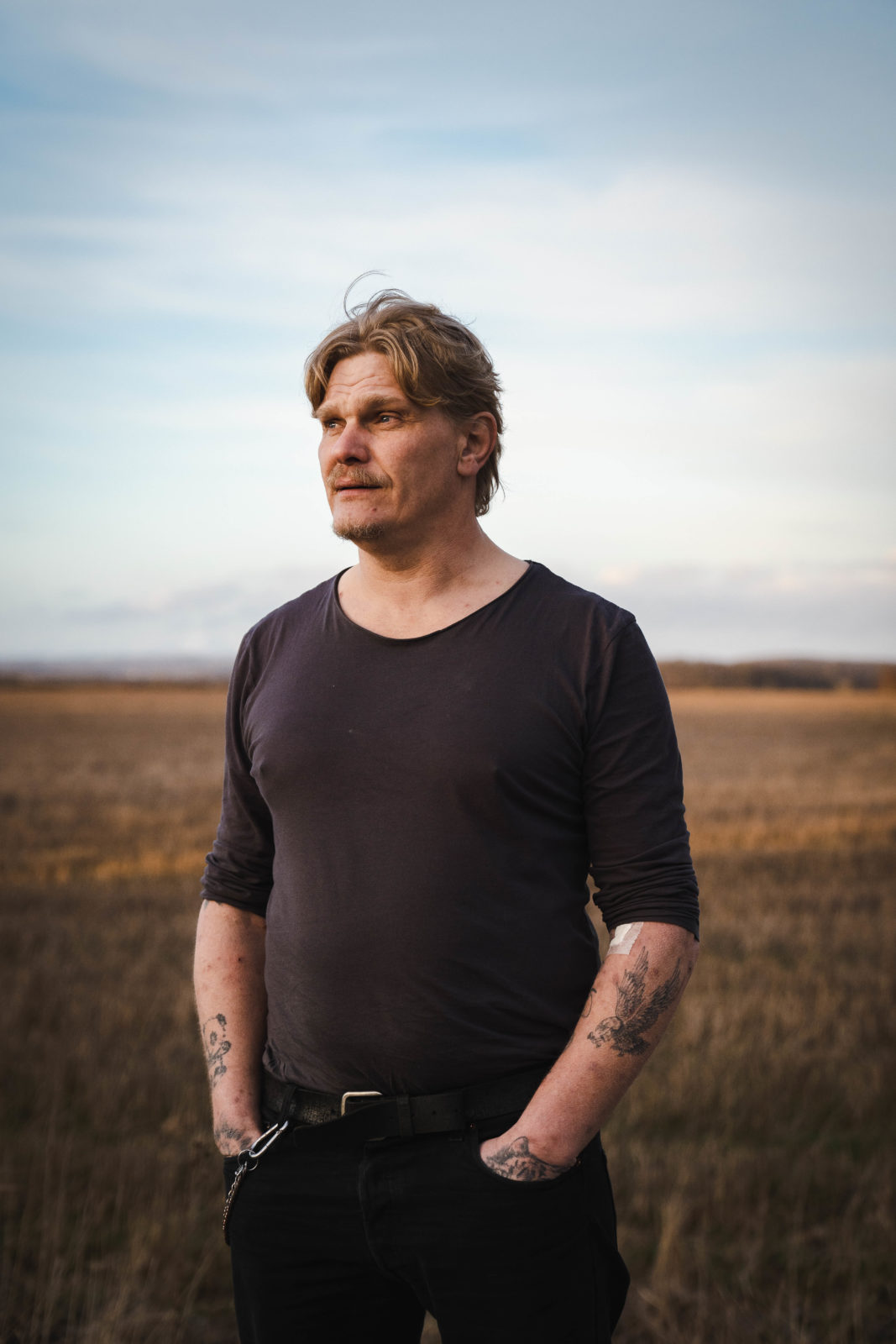
Morgan Hult, 53, spent three years at the Eolshäll boys’ home in the mid-1980s. He says that the foster father Göthe Ohlsson molested him about ten times. Photo: Sofia Nahringbauer
Morgan Hult says he was smoking cannabis the first time he was raped. He was 14 years old. He was “almost unconscious” on the bed at Eolshäll. He remembers Ohlsson’s heavy body, and the man’s stubbled cheek against his own.
“And how I woke up naked and in pain.”
Today, Morgan Hult is a 53-year-old father of seven who lives in Kvidinge in western Skåne. He runs his own business spray-painting kitchen cabinets. He has had rectal problems for 35 years.
“I have an arsehole like a cinnamon bun,” he says. “That’s what it looks and feels like. After I go to the toilet I have to take a shower because I can’t close it. It’s so fucked up.”
“They haven’t distanced themselves from me”
In preparation for this report, Morgan Hult told the story for the first time to colleagues in Skåne and to the five couples who are part of the family’s close social circle.
“They haven’t distanced themselves from me,” he says of his friends’ reaction.
In public, Göthe Ohlsson was treated as an authority.
Newspapers and television portrayed him as a good Samaritan who never started a family of his own in order to take care of “the hopeless cases, the untreatable cases that society throws at his door”, as SVT’s news programme Aktuellt put it.
Admittedly, there was scepticism and criticism among municipal officials, including those in the City of Stockholm. But Ohlsson had important partners who legitimised his activities. First and foremost was the Red Cross, which in 1979 founded a joint association with Göthe Ohlsson, the “Swedish Red Cross-MY Interest Association” (MY is the name of a rehabilitation ship owned by the association, Translator’s note). The organisation made the gruff Ohlsson “socially acceptable”, as the Red Cross described the relationship in its own 1992 publication, “The children are his life – about Göthe Ohlsson and his work.”
In addition to his damaged rectum, Morgan Hult suffered from severe nightmares and aggression after his time at Hälle.
His wife, Heidi Knudsdotter Hult — who sat in on three half-day interviews at their home in Kvidinge — says Morgan described himself as “lost” when they met in 1995.
Morgan Hult — a tall man, 6’1”, 220 pounds, with blond hair parted down the middle — panicked whenever he felt he was being abandoned. He was “deadly jealous” and slapped Heidi twice for looking at another man for too long.
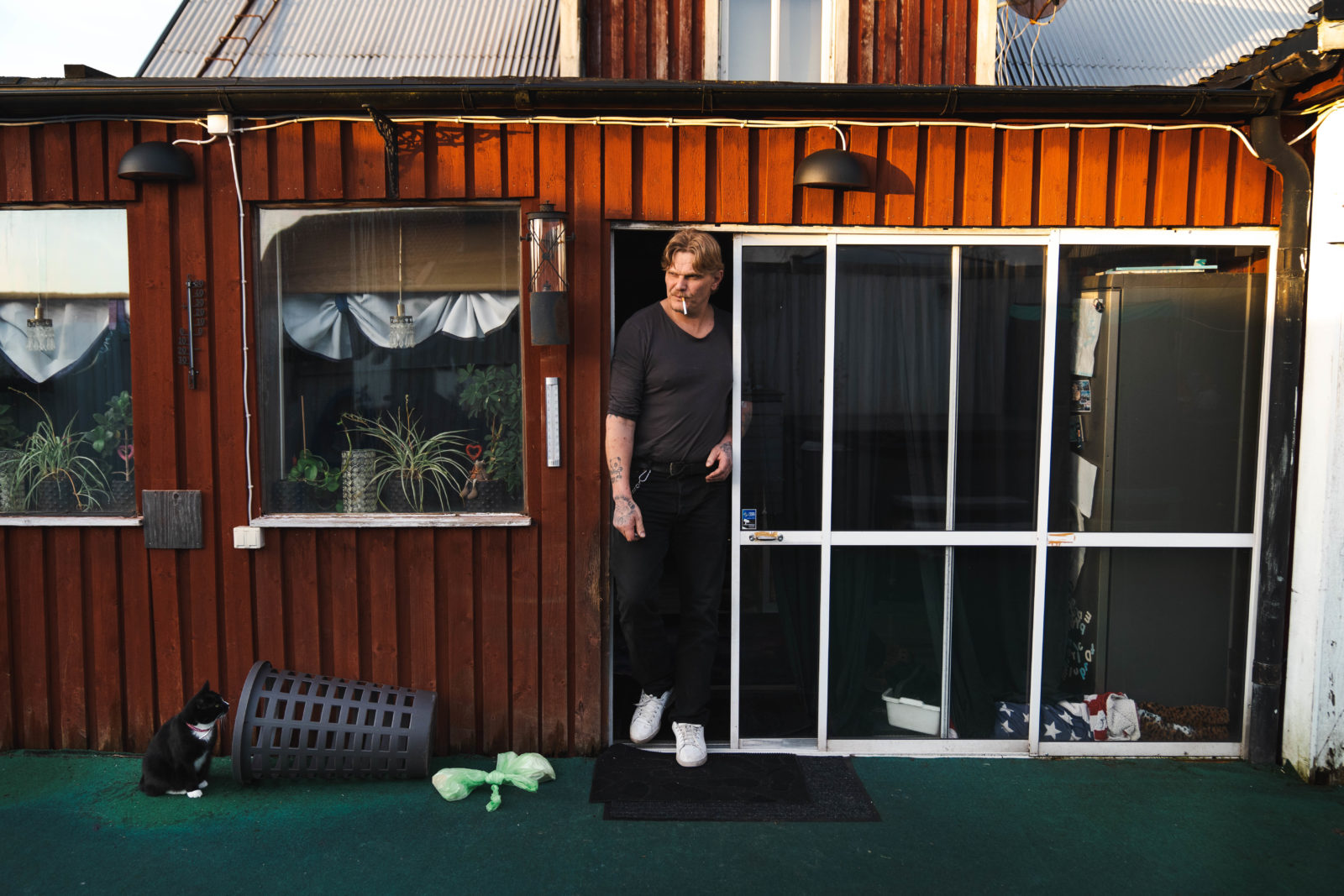
After the time at Eolshäll, Morgan Hult has suffered from aggressions and nightmares. In the mid-90s, he was imprisoned for assault. Photo: Sofia Nahringbauer
Morgan was jailed twice in the late 1990s for assaulting his wife. They still live together.
“He is the man in my life,” says Heidi Knudsdotter Hult.
In the early days of their marriage, Heidi was afraid to wake her husband in the morning. She would find him lying in wet sheets.
“I had to stand on the other side of the room. Otherwise, I risked getting hit,” she says, gesturing with a clenched fist.
“In the last month, since you contacted us, the nightmares have returned. Now it’s almost every night again. He screams in his sleep.”
“Where will Morgan live?” Bjuv’s social services ask
It’s the summer of 1984.
Morgan, 14, has punched the director of the youth centre in Eslöv in the face.
Morgan’s mother drinks and his father is a sea captain in international waters.
“Where will Morgan live?” Bjuv’s social services ask in a letter. “With mum, dad, somewhere else?”
The answer: Göthe Ohlsson.
It is September 1984 and Ohlsson is sitting in the Hult family kitchen in Bjuv. His Nissan Bluebird is parked outside.
Morgan and Ohlsson drive to the Eolshäll boys’ home on Eolshällsvägen in Hägersten.
When they reach Jönköping, Göthe asks Morgan to take the wheel. The 14-year-old drives all the way to Södertälje.
In the quiet of the car, Göthe strokes his inner thigh.
“Then his hand goes up . . . He gropes as soon as he gets the chance. He puts his arm around you and hugs you while you’re driving.”
The “fingering” is a prelude:
In Hälle, Göthe comes into Morgan’s room and hugs him good night. He kisses him in the kitchen. He strokes his bottom and his penis, first for a moment to see how Morgan reacts, then for longer if possible.
“But then he started using the hug as an excuse for something more. He got happier every time he could do it.”
Cuddling can feel loving.
“That hug meant everything to us,” says Morgan Hult. “But then he started using the hug as an excuse for something more. He got happier every time he could do it. He got more comfortable, talked more. He became more cheerful. And you got to go shopping for clothes.”
“But the worst thing is still the abuse,” he says. “When you wake up with no clothes on, your bum hurts and you feel completely groggy. When you’re shaking, crying, scared. When you take your little boat out between the islands outside Hälle and think about killing yourself.”
Below Eolshäll, in Lake Mälaren, lies an armada of huge military ships.
Along with the Red Cross, the Swedish Armed Forces is Göthe Ohlsson’s most important sponsor at that time. Göthe acquires about 10 military ships, which the boys maintain. In the summer, when the crew sets sail from Hägersten, Ohlsson is allowed to use the coastal artillery’s facilities on Kyrkogårdsön in the Stockholm archipelago. He is in contact with ministers, commanders and governors. “The navy has helped me with at least five generations of children,” Ohlsson tells the Red Cross in 1992. “Without them, the MY Association would not even have survived until the Red Cross stepped in with a helping hand.”
The image is compelling: the fleet of ships, Göthe Ohlsson in a weathered blue boat cap with a gold emblem, the presence of the military. Eolshäll can be seen as a fort, a fortress.
Ohlsson’s attitude towards his surroundings and the authorities can be hostile:
“These damned inspections! They come here several times a week,” he shouts at the reporter from Fib-Aktuellt. He dismisses bureaucratic regulations as “mental masturbation”. He runs, says Allers, “Sweden’s toughest youth centre”.
But within its walls, Eolshäll is bohemian.
Ohlsson has rented out the basement to a motorcycle club. There are spare parts in the bathtub.
Göthe makes light of laws and regulations.
Sometimes he gathers a bunch of boys and goes to Martin Olsson’s wholesale store in Storängsbotten, punches holes in a big pack of toilet rolls and lets the boys stuff the box with beef fillets and cheese.
At home, Göthe Ohlsson goes to the toilet with the door wide open. He walks around half-naked and sleeps without underwear. When he wakes the boys up, “the balls are hanging and dangling” in front of their eyes, recalls Morgan Hult.
The boys can lock their doors from the inside. But Göthe has a master key and doesn’t hesitate to use it.
Morgan Hult ties a piece of string between the door handle and his big toe so that he wakes up when Göthe opens the door.
Göthe Ohlsson was given a “special permit” by the Stockholm police to “drive around freely with the emergency bus” looking for drunk and high boys
The boys at Eolshäll don’t have a fixed schedule. After school they wander around as they please. But sometimes Göthe takes his Volkswagen van to pick them up and take them to the boys’ home.
He calls his outreach programme “MY Youth Emergency Service.” In the mid-1980s, the Red Cross donated 80,000 kronor to the cause, and Göthe Ohlsson was given a “special permit” by the Stockholm police to “drive around freely with the emergency bus” looking for drunk and high boys between the ages of 12 and 15, according to the Red Cross. Both strangers and his own boys were picked up.
One night, when Mikael is “completely drunk” in the centre of Stockholm, Göthe picks him up.
Mikael is from Uppsala and lives in Eolshäll. He came there as a 13-year-old in 1976, eight years before Morgan Hult. They did not meet then and do not know each other now.
That night in town, when Mikael was drunk, his life changed. Mikael describes it in a handwritten letter from 2013.
“ . . . I only have a little memory of what happened when we got home,” writes Mikael, “I remember that he helped me into my room, then I only remember fragments of what he did to me, he groped me and tried to kiss me, when I woke up the next morning I was naked in my bed. After that he was as nice as ever. I felt really bad. I didn’t know what he had done to me . . . but he made it up to me with money to go to the cinema, a packet of cigarettes every morning and weekly pocket money.”
Today, Mikael is a 59-year-old disabled pensioner who lives in Gröndal, south of Stockholm. He doesn’t want to be interviewed — but he provides me with copies of his medical records from the Addiction Centre in Stockholm and other documents that give an insight into his time with Ohlsson.
Mikael arrived at Eolshäll on 27 December 1976. His father, an alcoholic, had died four years earlier. The social services in Uppsala wrote that the 13-year-old himself suffered from a “certain beer addiction.”
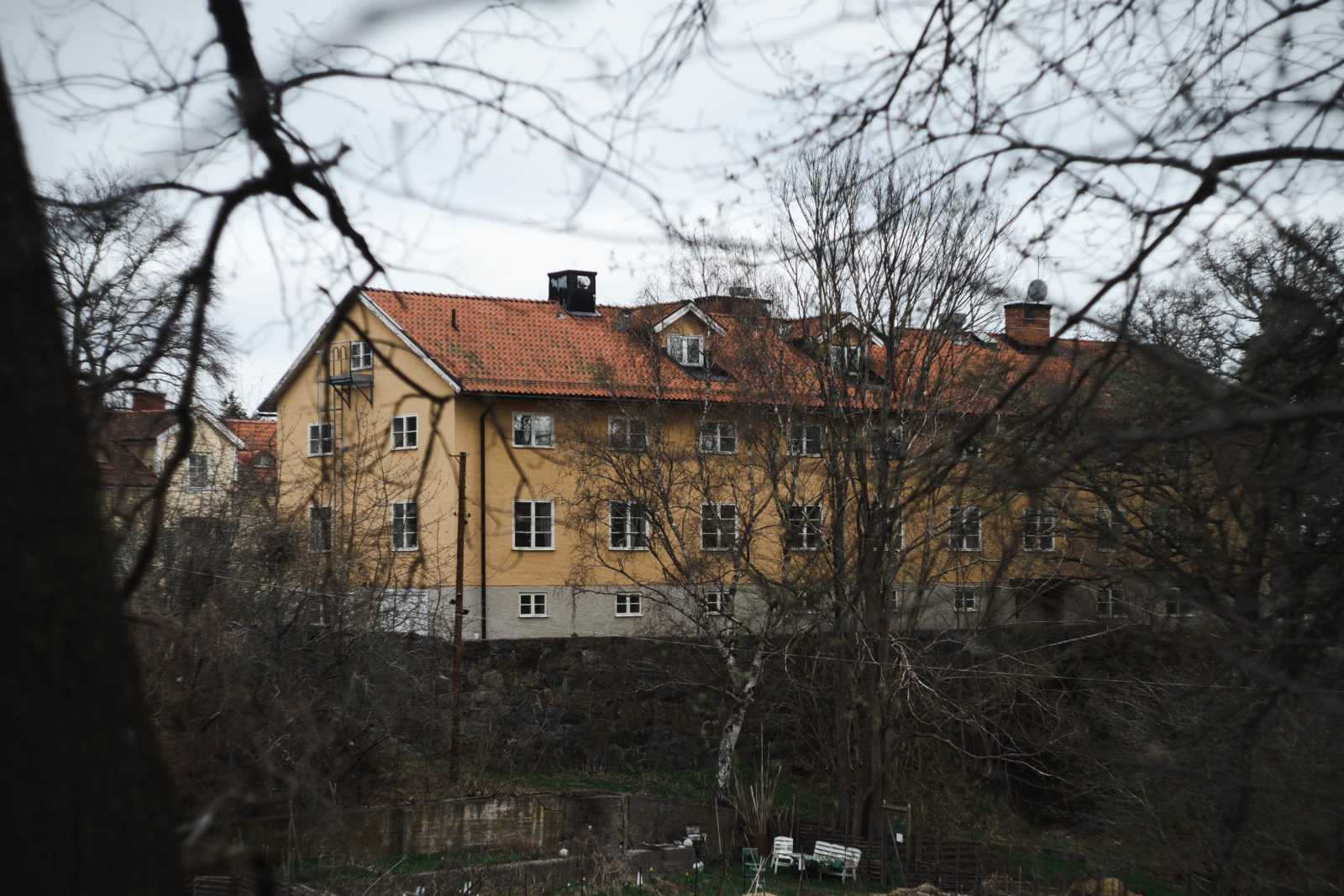
Eolshäll could be experienced as a fort under Göthe Ohlsson. But inside the walls, life was bohemian. Göthe slept naked and went to the toilet with the door open. Photo: Sofia Nahringbauerl.
A few months pass at Eolshäll. Göthe calls Mikael into his room. “Of course I went in, he was lying in his bed and asked me to come and sit down, which I did — when you’re 13 you don’t have such thoughts — but when he started groping me and asking me to lie down, I almost had to tear myself away. Then I ran to my room and locked myself in. I stayed in my room for two days, he tried to make me come out but I refused. Finally I came out and then he was really nice, I got a new stereo, a new sofa and money to buy clothes.”
Mikael became one of Ohlsson’s “favourites”, he writes. Göthe prefers newly arrived boys in their early teens. He is often very generous with them.
Göthe Ohlsson, the Red Cross writes, “gives them skateboards, cassette recorders, designer clothes, trips to the Canary Islands every winter and many other things that a normal family cannot afford.”
This generosity is also confirmed in Morgan Hult’s personal file from the Bjuv Municipality.
On 24 September 1984, a week after Morgan’s arrival, Göthe gives him a new jacket worth 800 kronor. “According to Morgan, every newcomer gets clothes from Göthe Olsson worth 3,000 kronor.”
Gifts can make boys loyal. A dependency can develop. Social workers take note. In an official memo in the archives of the county administrative board, a manager at the emergency room at the Maria Ungdom Center for Dependency in Stockholm sounds the alarm: Ohlsson has a “system of favourites” at Eolshäll.
A “favourite”, according to the Swedish dictionary, has an unduly privileged position with an influential person.
Mikael writes in his letter:
“He also had some guys who came and stayed in his room for a few hours and left with a red face and a new cassette deck under their arm.”
In 2013, Mikael claimed damages from the state as compensation for the abuse.
But Mikael was denied compensation because his placement with Göthe Ohlsson was bureaucratically ambiguous.
It was “boarding” — a voluntary placement — rather than compulsory care, the compensation board argued.
“I wanted to tell my story. But I wasn’t even allowed to speak. It was like double abuse,” says Mikael.
During the compensation process, the “horrific abuse” came back in the form of “nightmares and flashbacks”, according to Mikael’s records from the addiction centre.
He now lives a mostly quiet life indoors.
“Mikael says he feels like a powder keg,” the records says, “which is why he is reluctant to be out in public.” He is afraid that small incidents will lead to “unwarranted outbursts of anger”.
Mikael’s claims for compensation did not trigger an internal investigation by the City of Stockholm. At the time, the website of the prestigious Solstickan Foundation still listed Mr Ohlsson as the first recipient of its Solstickan Award in 1986.
However, in the wake of the abuse investigation, Göthe Ohlsson’s track record was scrutinised in the non-profit magazine Oberoende, published by RFHL, the National Association for Rights, Liberation, Health and Equal Treatment.
The 2013 article — based on a handful of anonymous testimonies — led to a cosmetic measure by the City of Stockholm.
A plaque in memory of Göthe Ohlsson was removed from the anchor that sits on the water’s edge below Eolshäll, symbolising the foster father.
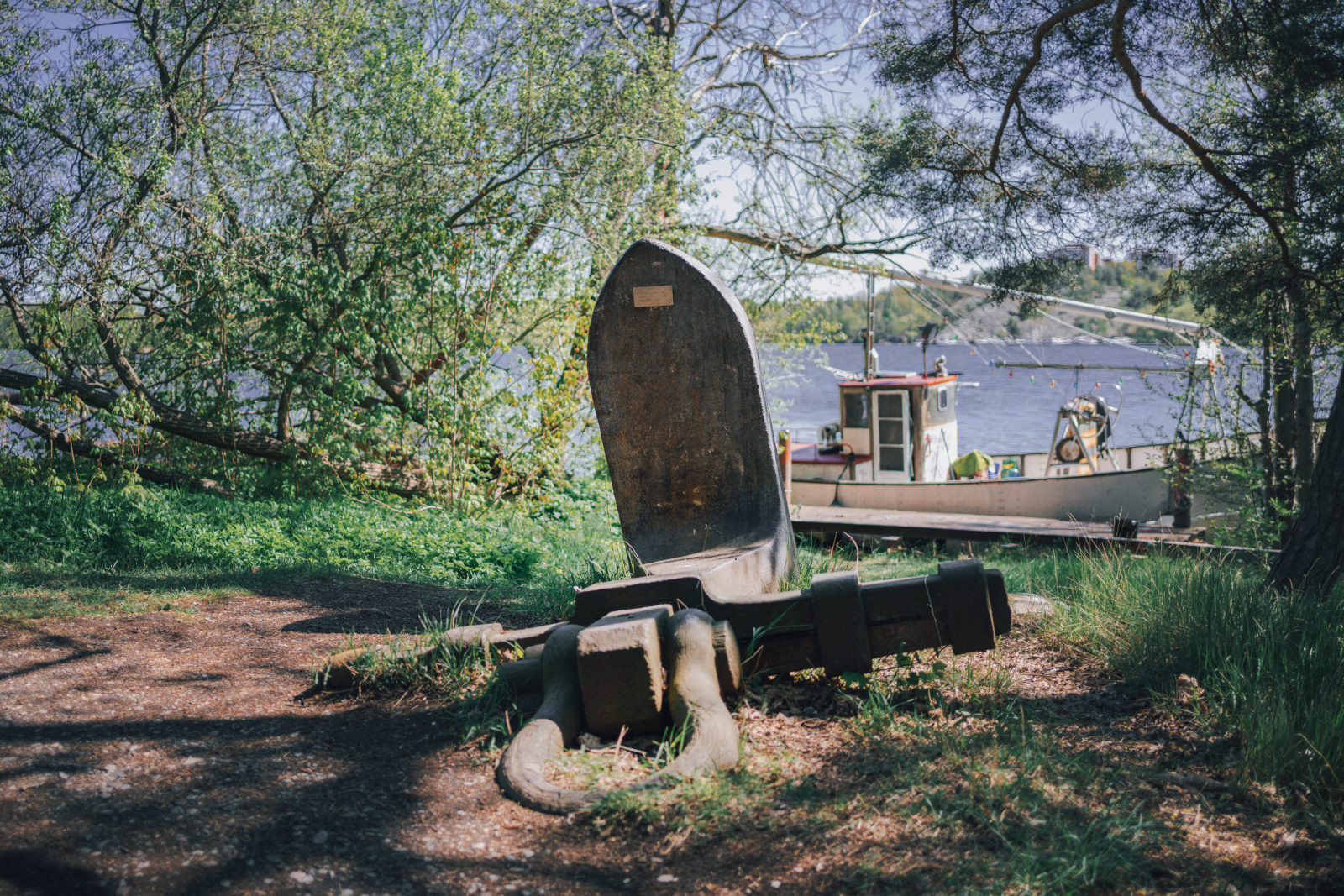
The anchor is a reminder of Göthe Ohlsson, who ran a foster home at Eolshäll from the mid-1970s until 1990. Photo: Sofia Nahringbauer
The anchor still lies in the grass. But the inscription on the new plaque now reads:
“Dedicated to the children at Eolshäll Boys’ Home 1977-1990”.
None of Göthe Ohlsson’s boys interviewed by DN have been contacted by the City of Stockholm or any other municipality since the city removed the plaque.
The magazine Oberoende has been discontinued and the author of the article, Anne Skånér, founder of the organisation The Stepchildren of Society, has died.
The Red Cross did not launch its own investigation into Eolshäll after the 2013 article.
“Perhaps that’s not surprising, because it wasn’t the Red Cross that ran the organisation,” says current Secretary General Martin Ärnlöv.
“Don’t misunderstand me: I think what happened was terrible. But the Red Cross Interest Association was a kind of fundraising organisation to support the operations financially. It was social services that were responsible for supervising the boys’ home.”
Today, no one in Stockholm’s political leadership wants to be interviewed.
Eolshäll also had its bright days.
Göthe’s boys had money and gadgets, scooters and boats.
They lived freely.
They could steer a cutter towards Kärsön, point the loudspeakers at Drottningholm Palace and blast Eddie Meduza’s “När Knugen Knulla Silvia” (“When the king fucked Silvia”) so loud that the water surface rippled (a reference to Queen Silvia of Sweden, Trans. note).
Or “borrow” some horses from the 4H organisation’s farm next to Eolshäll and ride into the centre of Axelsberg like the cavalry run amok.
Or teach Göthe’s parrot, the red-crested cockatoo, to say Mary pisshora (“piss whore”) so clearly that the housekeeper Mary — Göthe’s sister — packed her bags and refused to come back for a few weeks.
“You liked Göthe — or rather, all you had was Göthe. It was love in the wrong way, of course. But it was the only love you had.”
The latter story is told by Morgan Hult, who rode around Stockholm on a tuned-up Puch Montana moped.
“Göthe wasn’t too happy when I drove his Nissan on the Essingeleden motorway,” says Morgan.
Despite the anger, Morgan’s view of Göthe is conciliatory.
“You liked Göthe — or rather, all you had was Göthe. It was love in the wrong way, of course. But it was the only love you had.”
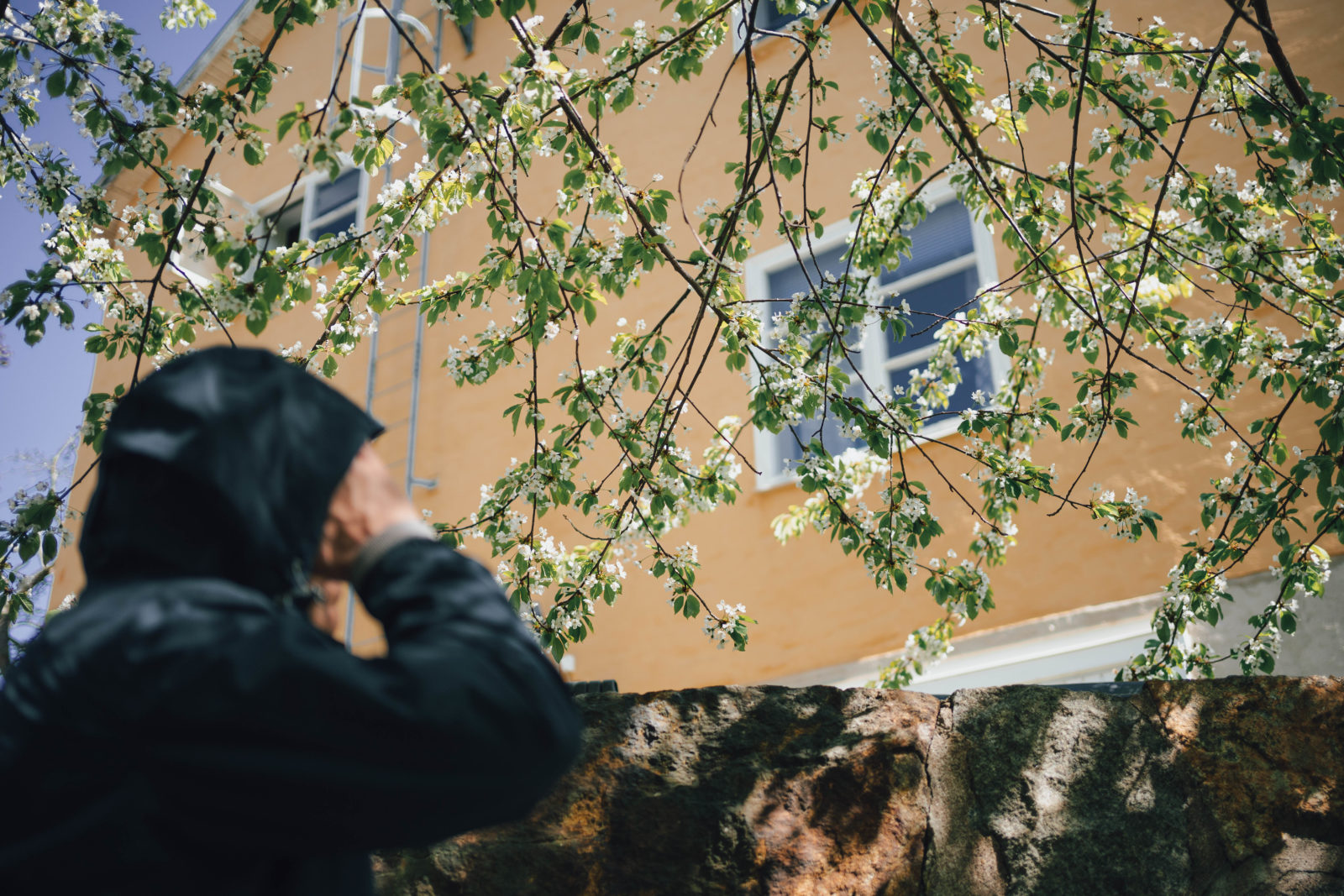
Jonas looks up at his old window at Eolhäll’s boys’ home. Here he was offered drugs after two weeks. The start of a decades-long addiction. Photo: Sofia Nahringbauer
Jonas visited a bathhouse in Stockholm and forced himself to look at naked old men.
This used to be difficult: men with Göthe Ohlsson’s proportions made him break out in a cold sweat.
Jonas, 54, has recently completed trauma treatment at the Alvik addiction centre, where he has come to terms with the fears of his year at Hälle.
When I meet him in a suburban centre and take out Göthe Ohlsson’s Red Cross tribute book with photos from Eolshäll, Jonas instinctively recoils in his chair.
It was 40 years ago.
Jonas lives with a feeling of having gotten off lightly
Jonas was never raped. But he estimates that he was fondled on his bottom and genitals about 100 times.
Jonas and other boys who were fondled by Göthe live with the feeling that they got off lightly.
Jonas feels guilty about his best friend at Hälle, David, who was the same age.
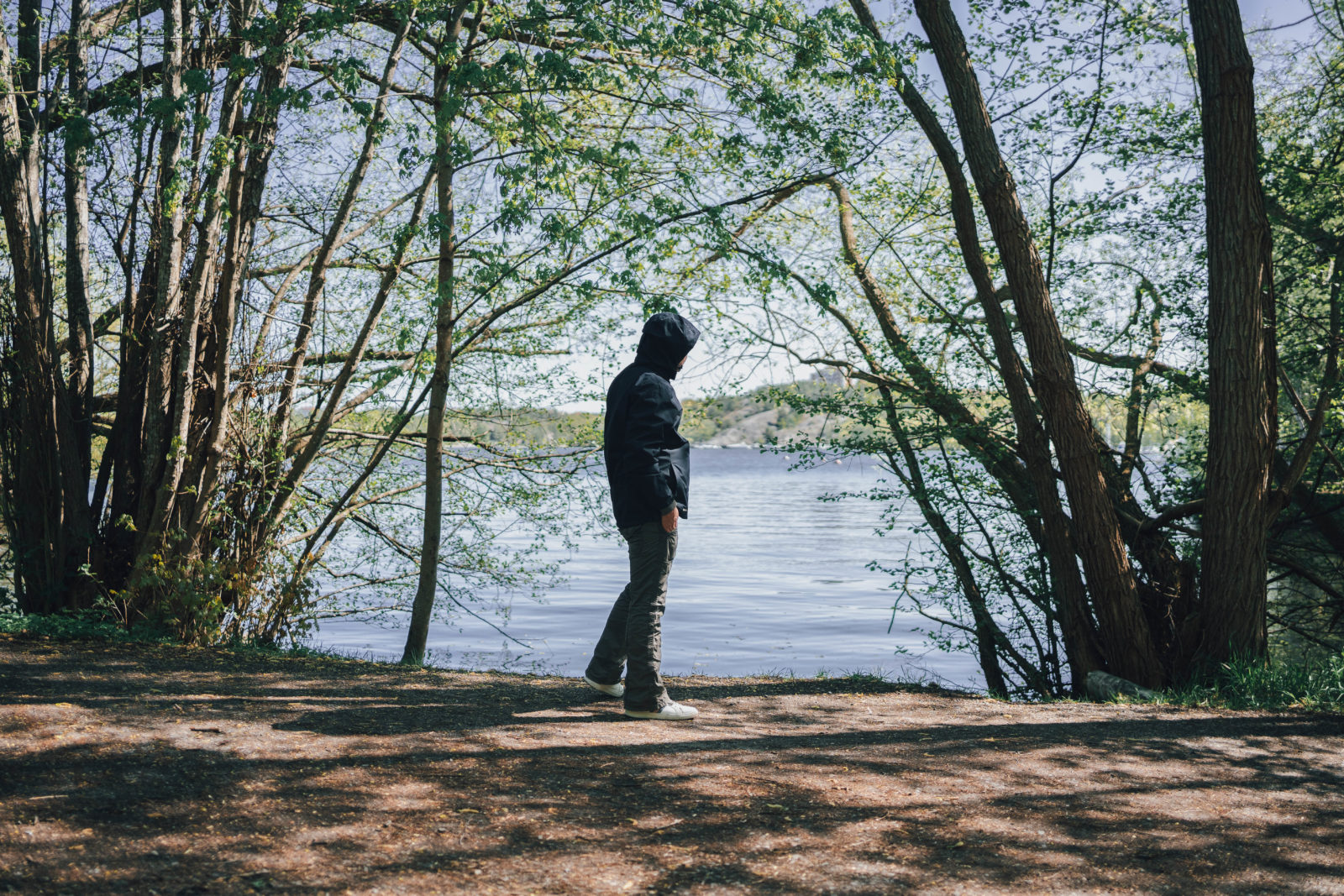
Jonas has recently completed a trauma treatment programme. This included walking around Eolshäll – where Göthe Ohlsson touched him about 100 times, according to Jonas’s estimate. Foto: Sofia Nahringbauer
After about seven months in Hälle, David asks Jonas to accompany him to his social worker in the centre of Skärholmen. Jonas goes with him.
“David tells them that he is tired of Göthe coming in and kissing him every night. He says: ‘I want you to do something’.”
Jonas listens. But he doesn’t act.
“At the time I thought he was mostly a weakling who couldn’t put his foot down,” says Jonas.
Jonas sees David break down. In Hälle, David starts showering for so long that he develops a rash. When David moves to a flat on Gröndalsvägen, he scrubs his skin with a brush and detergent when he takes a shower.
Jonas, who is often there, sees this with his own eyes when he goes to the bathroom to pee.
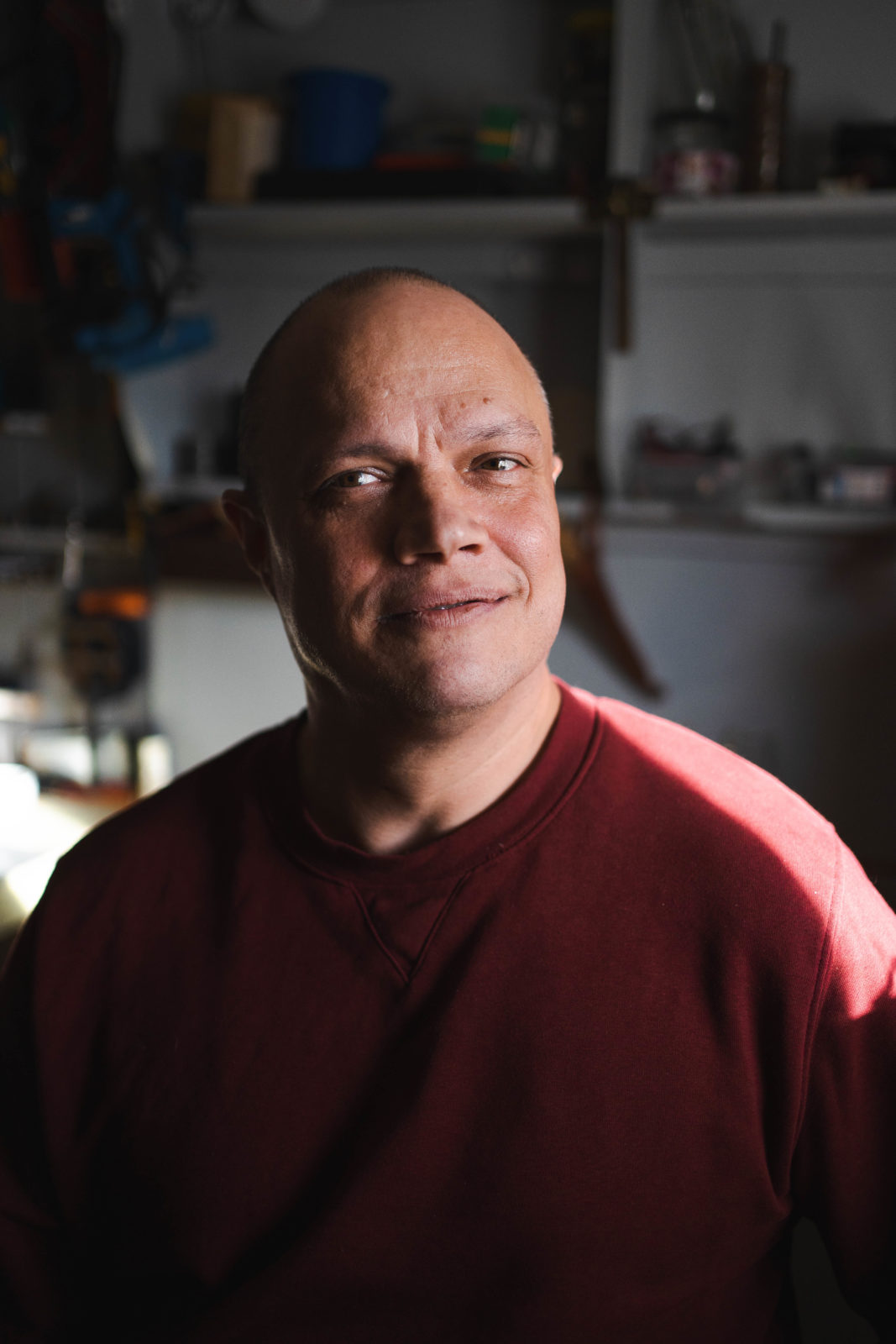
The abuse has left a deep mark on Leif Tillgren. “I might have lived a decent life and lived with my kid if it hadn’t been for Göthe Ohlsson,” he says. Photo: Sofia Nahringbauer
How many times was Leif Tillgren molested?
Around 20?
“More than that,” he says.
50?
“Yes. If you count all the times he asked me to caress myself so that I would ejaculate in front of him.”
Leif Tillgren grew up at Selmedalsvägen 72 in Axelsberg, a 750-metre walk from Eolshäll.
His mother, a shopkeeper, was out of town during the week. At the age of 12, Leif begins to explore Hägersten on foot. He has a severe stammer and is in a special class. He has “no friends, really”.
Göthe Ohlsson opens his arms to him.
“Göthe would say things like, ‘Who are you?’ He would hug you and stuff like that. He was just fucking nice.”
Leffe, as he is called, begins to spend the night in the “day room”. The room is for temporary guests that Göthe picks up on the bus, or boys from the neighbourhood who have problems with their parents.
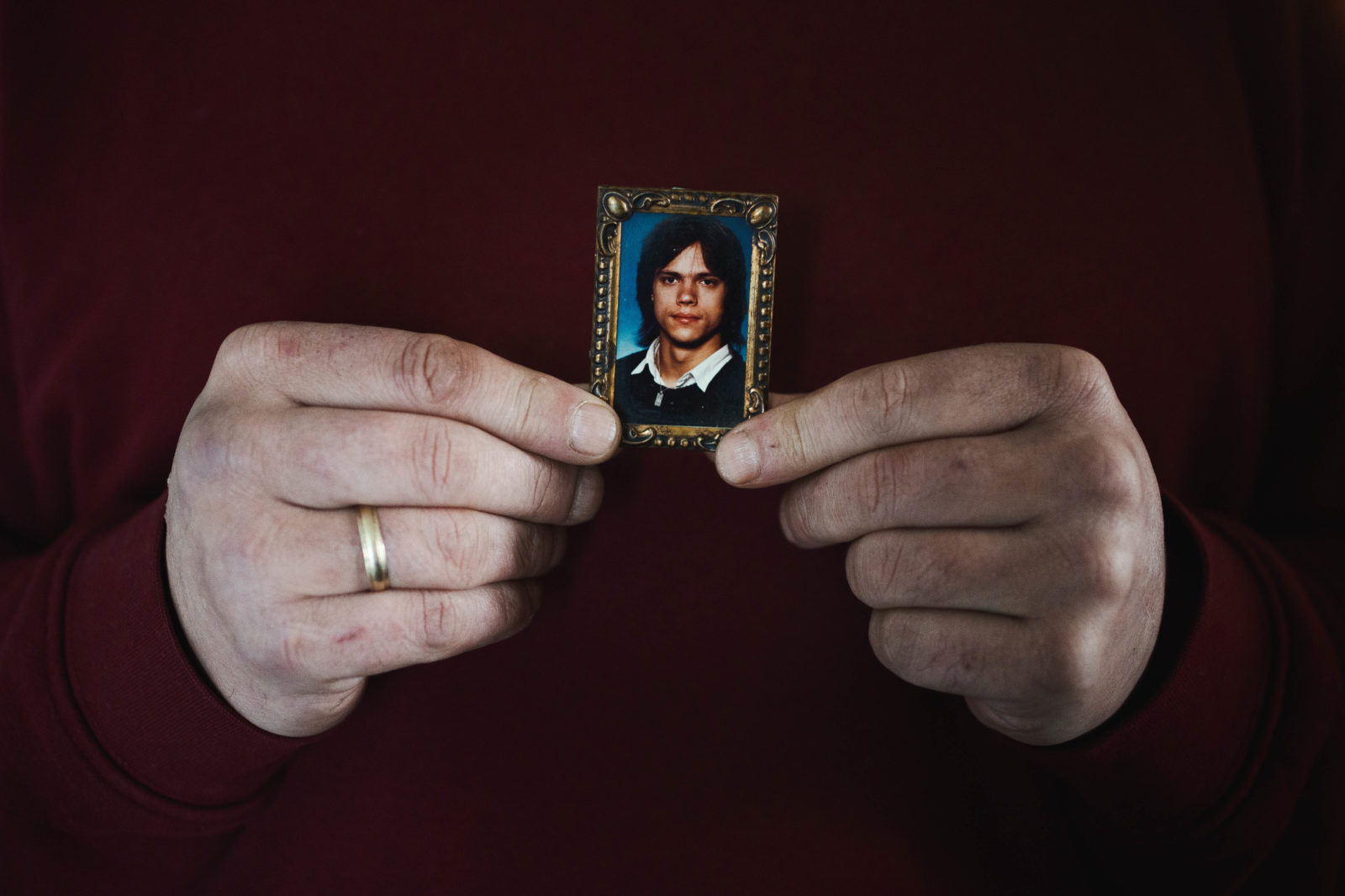
Leif Tillgren as a teenager. Photo: Sofia Nahringbauer
Leif gradually becomes part of the Hälle family. He gets his own room and a small boat. His mother gives Ohlsson permission to take her son to the Canary Islands one winter. Leif sleeps in Göthe’s hotel room.
A debt of gratitude accumulates. It just keeps growing.
When Leif — who had been an observer at Hälle — starts committing petty crimes to keep up with the older boys in the house, he gets caught.
He wants me to touch myself while he’s masturbating.
Payback time.
“I’m at the age where you get a bit curious about yourself. Göthe is like my psychologist. He says: ‘Don’t you usually touch yourself? Doesn’t it make you tingle?’ Yes, of course, it did.”
“’Isn’t it a bit nice when I do it like this?’ He wants me to touch myself while he’s masturbating. He tries to push my head down so I can suck him off. But I’d rather lie on his stomach and give him a hand job.”
Leif gets used to it quickly.
“You always have money. And after a while you almost think: ‘Isn’t he going to touch me a bit now?’”
On bad days, when Leif is bullied at school or pushed on the metro, Göthe is always there for him.
They take the car out on the old Södertälje road, and Leif gets to “practice driving”. Göthe focuses his attention on him.
Once, a school friend of Leif’s, Jesper, who comes from a functional family in Aspudden, joins them.
“I went along with Leif a couple of times when he was driving, and I saw how [Ohlsson] stroked the inside of his thigh. You knew it was wrong,” says Jesper Bergman.
When Leif turns 18, he finds a flat in Högdalen. He borrows Gothe’s white pickup to move his stuff, but stops at Hammarbyhamnen to get drunk.
On his way out he has an accident. When a security guard reports Leif to the police, Göthe Ohlsson gives him a false alibi. But he also threatens him: “You could lose your driving licence,” he warns Leif.
“The next day was the last time we did anything concrete: he started touching me while I was driving. Then he gets in the back seat and wants me to jerk off while he does it too.”
After that, Leif Tillgren moves out.
He says of his time with Göthe Ohlsson:
“I had a choice. I could have said no. But at the same time, I had no choice. Because I didn’t want to be alone.”
Leif Tillgren, 55, now lives with his Norwegian wife Linn on the island of Hitra outside Trondheim.
Their small mountain cabin overlooks an Arctic bay. In the distance, a panorama of snow-capped mountains. The couple’s Doberman Labrador, Biggi, stands in the snow, barking at the high clouds.
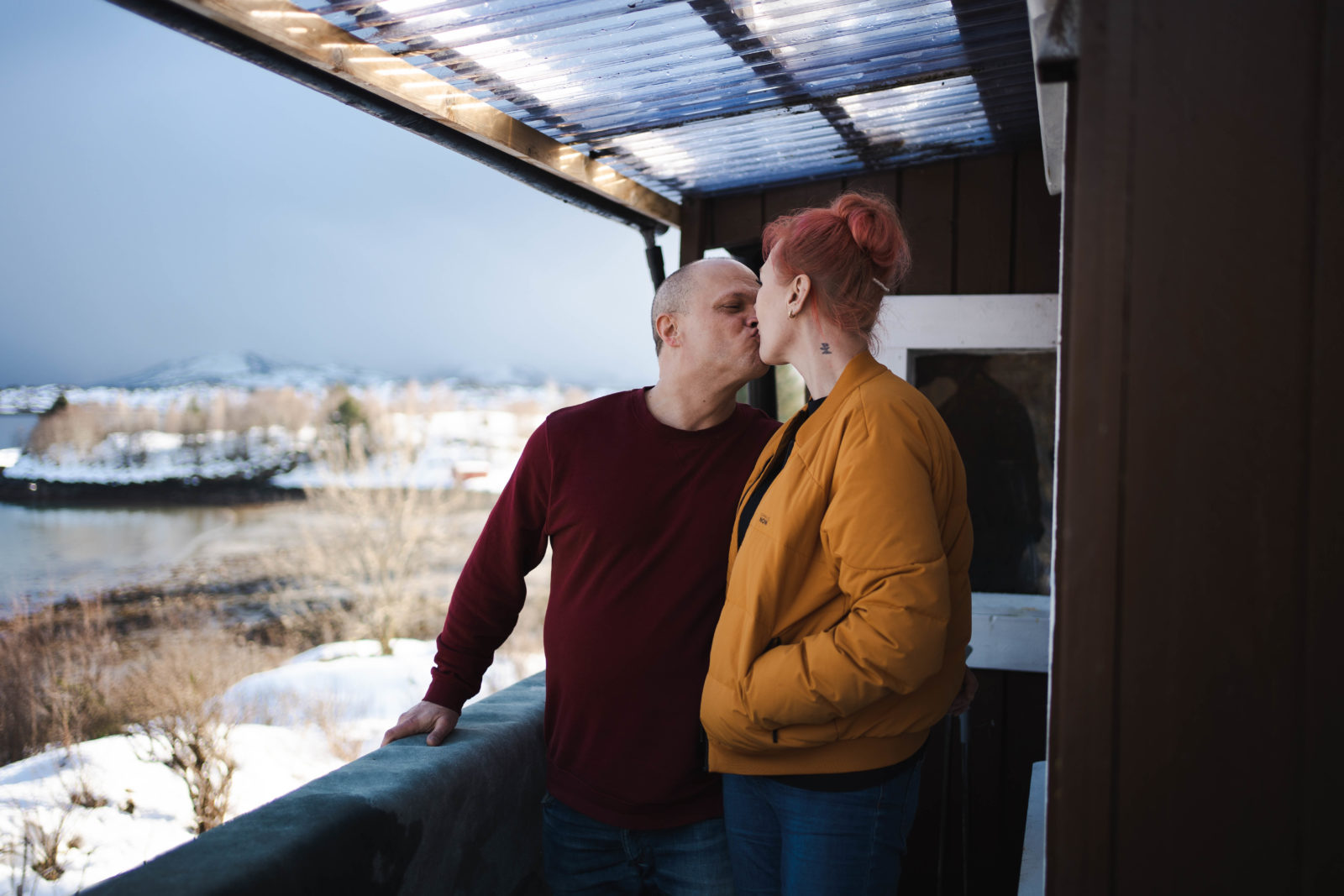
Leif and Linn Tillgren in their cottage at Hitra outside Trondheim. Linn was previously a customer of Leif’s when he sold drugs. They have undergone rehabilitation together. Foto: Sofia Nahringbauer
Leif and Linn met in 2008 when Leif was selling amphetamines from a flat in Trondheim. Linn was one of his customers.
Many of Göthe Ohlsson’s boys fell into long-term addiction after Hälle — the overwhelming majority of the residents, according to a social worker in Stockholm who spent time at Hälle as a child.
Jonas from Axelsberg was offered cannabis after two weeks at Hälle and smoked on average every other day. In 2018, when traces of drugs were found in his urine, he was fired from a large company after living as a “socially functioning addict” for several decades, he says.
Mikael from Uppsala, who woke up naked in his room in the late 1970s, started smoking cannabis to forget: “In general, Mikael tells us that he tried to suppress this event by taking drugs,” his records from the addiction centre say.
“If it hadn’t been for him, I might have lived with my child”
In a handwritten note in the archives of the county administrative board, the head of the Maria Ungdom centre is quoted as saying about Eolshäll:
“The young people abuse drugs, there are hashish scales in one of the rooms.”
Göthe Ohlsson promised society that he would free the boys who were stuck in life.
But today the men live in isolation.
“If it hadn’t been for him, I might have lived with my child,” says Leif Tillgren from his cabin in Norway.
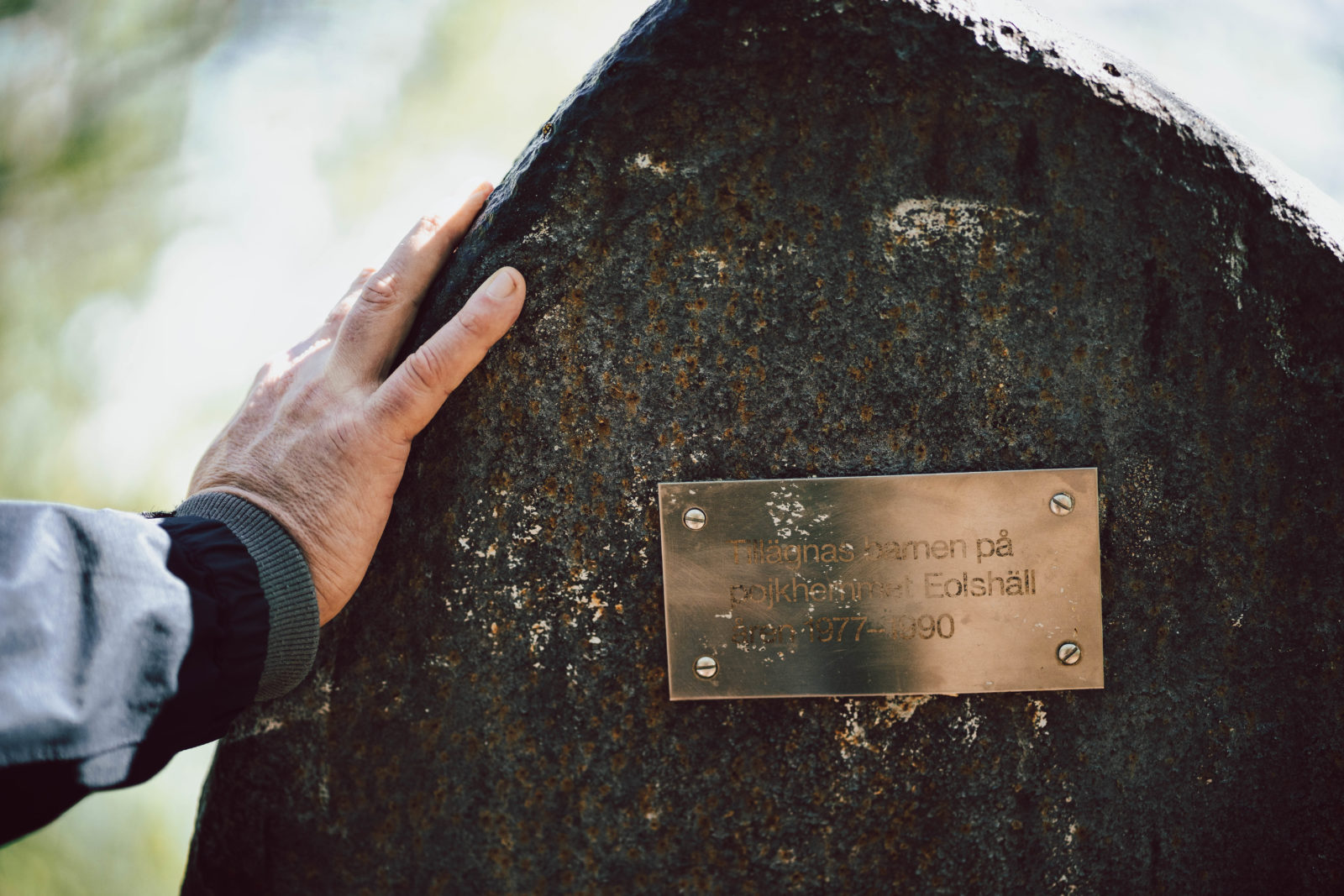
In 2013, the plaque on the anchor was replaced below Eolshäll. Now it says: “Dedicated to the children at the Eolshäll boys’ home in the years 1977–1990.” Photo: Sofia Nahringbauer
Göthe Ohlsson died suddenly on 15 May 1992. He was 66 years old. A few years earlier, Ohlsson had moved the boys’ home from Eolshäll to a mine sweeper ship in Norra Hammarbyhamnen. There, on board the Sturkö, a handful of boys lived.
Gudrun Göransson, president of the Red Cross, wrote in the daily Dagens Nyheter that Ohlsson fought to give the boys a “dignified life.” The Red Cross planned to award Ohlsson its highest honour after his death: the Gold Medal of Merit for a “unique social contribution.” The Red Cross paid for his funeral.
Morgan Hult was one of the last people to meet Göthe Ohlsson. In May 1992, Göthe called Morgan and wanted him to inherit his villa in Landskrona, which Ohlsson had kept during all his years in Stockholm.
One last “bribe,” says Morgan Hult. But outside, on the lawn where Göthe thought Morgan’s daughter would be playing, Ohlsson began to “rub his groin” against Morgan.
“He humped against me like a little puppy. It was exactly the same person. Nothing had changed.”
The next day, the Red Cross called to tell Morgan that Göthe Ohlsson was dead.

